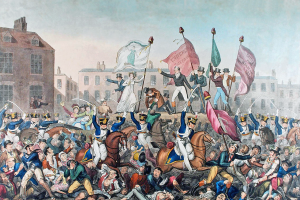On this page: Reform Struggles and Communism here ♦ Peterloo Masacre here ♦
Participate in Reform Struggles to Spread Communism
The letter “Reflections on How to Fight for Communism and Nothing Less” (Red Flag, Vol. 11 #8) made me think a lot about how we advance the struggles in the International Communist Workers’ Party and build it in quantity and quality.
“Tonight, I posted in WhatsApp a documentary called ‘Workers without a boss.’ Do you think it is very reformist?” I asked my partner.
“I think so, but there have been many discussions in the Party here about how we have participated in reform struggles in the factory,” he said.
Many ICWP comrades in the factories were union organizers when we met them. However, when they saw how we participated in their struggle, and raised it to another level in the extended meetings, they began to analyze that there was a world beyond the union.
There was a big internal discussion when one of the comrade Party leaders participated in a struggle to improve the water quality inside a factory. “Because the Party does not support us at the moment,” she told us. Our whole leadership group met to try to give a communist explanation of why reform struggles don’t advance the struggles of our class.
We concluded, with the help of the international ICWP leadership, that we should support these types of struggles for reforms, without being the ones leading them, in order to meet more workers and share our communist line with them.
Workers said:
“I had never heard anything about Communism, but I saw that the Red Flag comrades inside the factory are very supportive, and they make excursions to the beach and the mountains.”
“Several times they had invited me to meetings, but I was afraid of communism, because of everything the union members have told me.”
We have socialized with these workers, who had never heard of Marxism-Leninism in their lives, much less Dialectical Materialism, who had been very militant in the union. Many have stayed with us and our communist line. Many ask our comrades for support inside the factory when there are confrontations with the bosses.
We have distributed the flyer “Who is stealing from whom” in the factories. It has been very well-received by the workers. Some union leaders, seeing their militancy, tell them not to meet with us. But when they need to, they come to ask our comrades for ideological support. Because they already see them as more politically advanced. That makes more workers approach them.
In our leadership meetings we have discussed Reform and Revolution, and how we should be present in the struggles of the factory workers. The reform should not absorb us, but fights for better wages and lower production goals serve us to tell the working class that there is the possibility of a world without money, without borders. That proletarian internationalism is possible and that they must join the International Communist Workers’ Party.
—Comrade in El Salvador

Peterloo Massacre
“Peterloo” Movie Builds Working-Class Confidence
A movie about a brutal massacre of working-class families at a protest rally sounds defeatist. The movie “Peterloo,” however, fills you with both class anger and class confidence.
Peterloo is the name history has given to the massacre of workers at a rally in Manchester, England in 1819, a few years after the English defeated Napoleon at the battle of Waterloo.
The film builds our class anger through a series of contrasting scenes. The public praise and rich rewards of money and promotions to the Army officers is counterposed to the silent dismissal of the foot soldiers. From three short scenes in the Manchester magistrate’s court, we glimpse the brutality of class rule. And from conversations in different settings we understand the elite’s fear of the French Revolution alongside the working class’s support of it.
And it builds our class confidence in scenes that show the breadth and variety of organizing that built the protest movement. Women’s groups meeting in run-down halls, political groups in public houses, smaller groups writing a leaflet, armed groups training in secrecy and family discussions in the kitchen. In all of them there are conflicts as unity and disagreement co-exist.
In fact, although the movie features the massacre at Peterloo, it is not about the massacre. It is about the building of a mass working-class movement.
And the movie isn’t about the weaknesses of that movement. It’s about the mistakes it made in ceding leadership at the very last moment to a rich “big name” pacifist orator. You don’t leave this movie with a sense of defeat. You leave it with the sense Mao captured in his revolutionary days: “Fight and lose; fight and lose…until we win!”
—California (USA) comrade

